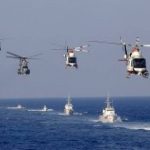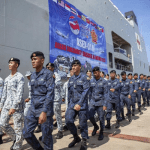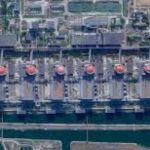Iran’s Islamic Revolutionary Guard Corps (IRGC) has launched military exercises to show its readiness to defend three disputed islands that the United Arab Emirates (UAE) claims as its own.
The elite force ran the unannounced drills early on Wednesday, mainly off the coast of Abu Musa which along with Greater Tunb and Lesser Tunb are islands in the Gulf that Iran controls but have recently been increasingly the subject of political tensions.
In 1971, the then-shah of Iran dispatched the royal navy to the three islands in the mouth of the strategic Strait of Hormuz after the British withdrew their forces from what is today the UAE.
Emirati leaders have since maintained that the islands belong to them, with support from other Arab states. Iran has dismissed these claims, rejecting the possibility of any negotiations over their ownership.
Last month, Iran’s foreign ministry summoned the Russian envoy in Tehran to protest against Russia’s joint statement with the Gulf Cooperation Council (GCC) that challenged Iran’s rights over the islands.
China, another strategic ally of Tehran, made a similar move in December, with President Xi Jinping signing a joint statement with the GCC that supported the UAE’s right to follow up on the ownership of the islands internationally.
That also led to the Iranian foreign ministry summoning the Chinese ambassador to Tehran to protest against the move.
On Wednesday, the IRGC deployed an array of aircraft, vessels, missiles and vehicles to showcase its readiness to mobilise on the islands.
State media said the IRGC Navy for the first time unveiled a new vessel armed with missiles with a range of 600km (372 miles), while Fath ballistic missiles with a range of 120km (74 miles) and Ghadir cruise missiles with a range of more than 300km (186 miles) also installed on the islands.
Images from the exercises showed large numbers of security personnel, missile defence systems and anti-aircraft weaponry deployed on the islands. State media said the IRGC also used drones and remote-controlled vessels and simulated rapid response scenarios to defend the islands.
“The islands of the Persian Gulf are the honour of the great nation of Islamic Iran, and as children of this brave nation, we are duty-bound to defend our honour,” Alireza Tangsiri, the commander-in-chief of the IRGC Navy, said in a ceremony to mark the start of the drills.
Hossein Salami, the IRGC commander-in-chief, reiterated Iran’s position that Tehran and its Arab neighbours are fully capable of defending regional waters on their own and do not need the presence of “foreigners”.
“So long as your fingers are on the triggers, our people are calm and our territory is safe,” he told the soldiers gathered at the inauguration ceremony.
The latest exercise and the comments also come as the United States is increasingly deploying troops and equipment to the region in a stated response to Tehran’s recent seizure of several ships.
Thousands of US soldiers and sailors have been deployed to regional waters on amphibious assault ships and landing ships, adding to an array of warplanes and jet fighters and a destroyer that were already dispatched.
The Pentagon has said the move is in response to Iran’s alleged attempts to “threaten the free flow of commerce in the Strait of Hormuz and surrounding waters” through which about one-fifth of the world’s oil passes.
Last week, Iran unveiled a new cruise missile called Abu Mahdi with a stated range of more than 1,000km (621 miles) that it said could specifically target US aircraft carriers in the region if necessary.
The missile was named after Abu Mahdi al-Muhandis, the Tehran-aligned Iraqi commander who was assassinated along with Iran’s top general, Qassem Soleimani, in a US drone strike in Baghdad in January 2020.














